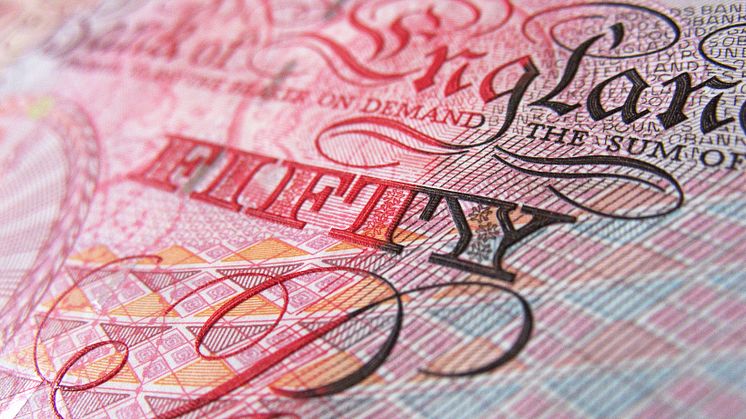
Press release -
UK Expats hit by poor exchange rate, rising prices and high cost of transferring funds
- £228m wasted by 1.5m+ UK expats transferring money via UK banks
- Annual losses of £000s when bank charges are added to exchange rates
- Expat confidence remains low as living costs rise by an average of over eight per cent year-on-year
- House values still falling in Europe: by over 25 per cent for a quarter of UK homeowners in Spain
UK citizens living abroad are already facing falling property values, rising household prices¹ and a lower exchange rate for their pounds² than a year ago. Now research by Post Office® International Payments has revealed that they could find themselves even worse off if they transfer money from a bank to fund their increased living costs.
Yet over half of expats worldwide transfer funds from the UK via their bank. Consumer research among members of ExpatForum.com³ for the second Post Office Expat Payments Index found that over 1.5 million expats individually waste an average of almost £152 annually by transferring money via a UK bank and incurring transaction charges. Collectively this means that they spend £228m more than if they had used a fee-free international payments provider like the Post Office.
For some UK expats the costs could be considerably higher. A survey of seven UK banks conducted for Post Office International Payments by independent researchers found that they would pay at least £9 in bank charges for one transfer of £500 but this could escalate to as much as £25 per transfer, depending which bank they used4.
With the continuing weakness of sterling, the research found that many expats whose savings and pensions have been eroded in recent years may be hoping exchange rates will improve in the coming months and are transferring smaller amounts of cash monthly. Over a third of the expats surveyed (35.3 per cent) transferred funds monthly. By using a bank to transfer funds, they could pay up to £184 more on monthly transfers of £500 than if they used Post Office International Payments5.
Furthermore, over one-in-five expats said they made transfers of at least £5,000 and they could lose even more on these higher value transfers because none of the banks surveyed offered improved exchange rates. Two banks (HSBC and Lloyds TSB) actually increased their charges for higher value transactions. As a result, bank transfers could cost up to £470 on quarterly transfers of £50006 into euro, up to £270 on one transfer of £10,000 and up to £524 on one transfer of £20,0007.
The extra cost of transferring money abroad via a UK bank comes as the Expat Payments Index revealed that expats are continuing to feel the squeeze. Although the level of living cost rises has slowed compared with that reported in last year’s index, the Post Office research still showed that household bills, motoring and eating out are up by an average of over eight per cent – around three times the UK inflation rate.
Price rises were higher than this for many of those surveyed by the Post Office. Two-in-five said that their overall living costs had increased by over 10 per cent – with food and household bills (notably electricity) causing the greatest concern.
And more property owners this year reported a fall in the value of their home – 52 per cent compared with 40 per cent a year ago. Over a quarter (26.7 per cent) said their property had dropped in value by over 10 per cent in the past 12 months while more than one-in-ten (11.5 per cent) reported falls in excess of 20 per cent.
The position was again worse for expats living in Europe – particularly in Portugal and Greece, where this year’s index picked up a deteriorating situation. Price rises reported by expats were higher than for any other country surveyed. Increases of over 20 per cent for household essentials were commonplace in Portugal with almost one-in-five expats experiencing this level of price rise.
In Greece over two-thirds (69.6 per cent) of UK citizens said their living costs had risen over 10 per cent in 12 months, while three-in-ten put the increase at over 20 per cent and 17.4 per cent at over 30 per cent.
Although price rises were lower in Spain than reported in the first Expat Payments Index last summer, a worsening picture emerged when the Expat Forum respondents were questioned about the value of their homes. While similar numbers to last year – 70 per cent of homeowners – reported falls in the value of their property in the past 12 months, more of them (26.1 per cent) believed their home was worth over 25 per cent less and 18.5 per cent quoted a perceived drop in value of over 30 per cent.
Confidence levels were lower among European respondents. 82.2 per cent said their lifestyle had been affected by price rises. Expats living in France were far more negative than a year ago. Only 14.3 per cent claimed to be unaffected by increasing prices compared with 24 per cent in 2012 and a quarter were resigned to rising fuel prices – picking up an increased mood of resignation common across the Eurozone.
John Willcock, Head of Post Office Transactional Services, said: “It is scarcely surprising that confidence levels are low among the expat community abroad. While house prices are reportedly on the rise in the UK, property values are still falling overseas – particularly in the Eurozone. Rising prices for basic household essentials are leaving little money for extras like eating out and this year’s index reveals that many more people are planning cut backs in order to keep their heads above water. “Despite this, we found that many hard-pressed expats are wasting money they can ill-afford by paying charges to transfer funds via their bank. Depending which bank they use and how much they transfer, they could lose hundreds of pounds that could help offset the increased price of food, motoring and household necessities.”
Appendix I of the Expat Payments Index provides a breakdown of the findings of the Post Office consumer research while Appendix II itemises the results of independent pricing research conducted for Post Office International Payments.
1. 730 worldwide members of ExpatForum.com, a leading online forum for UK nationals based overseas, took part in the Expat Payments Index and reported an increase in living costs, falling property values and low confidence levels (see Appendix I).
2. Source Post Office: sterling is worth five per cent less year-on-year against the euro (10 Sept 2013).
3. The total of £228 million wasted on bank charges was calculated by taking the mean average (£12.64 per transaction) of charges levied by the seven banks surveyed by Post Office International Payments. This transaction charge was multiplied by 12 to allow for monthly transfers, the average payment frequency cited by survey respondents, and the resulting figure of £151.68 was multiplied by 1.508 million to reflect the number of expats transferring funds via their bank. The latest published figures (2006) suggest that there are 5.5 million UK nationals living abroad. From this, the figure of 1.508 million was calculated on the basis that 54.4 per cent of expats (2.99m) transfer funds from the UK and 50.4 per cent of this group do so via their bank (source: Expat Payments Index).
4. Telephone research by Research & Marketing Solutions for Post Office International Payments, August 2013, found that the minimum transfer charge made by the UK banks and international payment providers it researched was £9 (HSBC), rising to £25 per transaction (Nationwide).
5. Research for Post Office International Payments found that a single transaction made through a bank would cost more than at the Post Office as a result of bank charges. 12 monthly transactions could cost up to £184.44 more than through its own fee-free service on a euro transfer of £500.
Exchange rates/charges for a euro transfer of £500:
Single transaction and 12 monthly transactions
Provider | £500 in Euro | Minimum Charge | Extra transaction cost vs Post Office | Extra annual cost vs Post Office |
Post Office | £560.20 | £0.00 | ||
Lloyds TSB | £570.15 | £10.00 | + £1.27 | + £15.24 |
HSBC | £567.50 | £9.00 | + £2.57 | + £30.84 |
Halifax | £565.00 | £9.50 | + £2.97 | + £63.00 |
RBS | £565.50 | £10.00 | + £5.31 | + £63.72 |
NatWest | £565.50 | £10.00 | + £5.31 | + £63.72 |
Barclays | £563.15 | £15.00 | + £12.38 | + £148.56 |
Nationwide | £571.20 | £25.00 | + £15.37 | + £184.44 |
6. Post Office research revealed that higher value transfers of £5,000 in euro made quarterly for a year could cost up to £470.20 more than through its own fee-free service:
Exchange rates/charges for a euro transfer of £5,000:
Single transaction and four quarterly transactions
Provider | £5,000 in Euro | Minimum Charge | Extra transaction cost vs Post Office | Extra annual cost vs Post Office |
Post Office | €5,747.00 | £0.00 | ||
Halifax | €5,707.00 | £9.50 | + £44.54 | + £178.16 |
Nationwide | €5,712.00 | £25.00 | + £55.64 | + £222.56 |
Lloyds TSB | €5,701.50 | £17.50 | + £57.40 | + £229.60 |
HSBC | €5,675.00 | £17.00 | + £80.44 | + £321.76 |
RBS | €5,655.00 | £10.00 | + £91.34 | + £365.36 |
NatWest | €2,655.00 | £10.00 | + £91.34 | + £365.36 |
Barclays | €5631.50 | £15.00 | + £117.55 | + £470.20 |
7. Post Office research revealed that a single transfer of £10,000 into euro could cost up to £269.82 more than through its own fee-free service. A single transfer of £20,000 into euro could cost up to £524.63:
Exchange rates/charges for a euro transfer of £10,000
Provider | £10,000 in Euro | Minimum Charge | Extra cost vs Post Office |
Post Office | €11,550.00 | £0.00 | |
Nationwide | €11,424.00 | £25.00 | + £135.29 |
Lloyds TSB | €11,403.00 | £17.50 | + £146.41 |
HSBC | €11,350.00 | £17.00 | + £193.21 |
RBS | €11,310.00 | £10.00 | + £222.20 |
NatWest | €11,310.00 | £10.00 | + £222.20 |
Halifax | €11,300.00 | £9.50 | + £230.74 |
Barclays | €11,263.00 | £15.00 | + £269.82 |
Exchange rates/charges for a euro transfer of £20,000
Provider | £20,000 in Euro | Minimum Charge | Extra cost vs Post Office |
Post Office | €23,100.00 | £0.00 | |
Nationwide | €22,848.00 | £25.00 | + £245.59 |
Lloyds TSB | €22,806.00 | £17.50 | + £275.33 |
HSBC | €22,700.00 | £17.00 | + £369.42 |
RBS | €22,620.00 | £10.00 | + £434.40 |
NatWest | €22,620.00 | £10.00 | + £434.40 |
Halifax | €22,600.00 | £9.50 | + £451.98 |
Barclays | €22,526.00 | £15.00 | + £524.63 |
Categories
About the Post Office
The Post Office (Post Office Limited) has an unrivalled national network of over 11,500 branches across the UK, more than all the high street banks combined, and sits at the heart of communities in Northern Ireland, Scotland, Wales and England. The Post Office has made a commitment to maintaining its network of branches at its current size and reach. It provides around 170 different products and services spanning financial services including savings, insurance, loans, mortgages and credit cards; Government services; telephony; foreign currency; travel insurance and mail services.
The Post Office serves over 17 million customers a week and a third of small businesses. Some 99.7% of the total population live within three miles of a post office and over 97% live with one mile of a post office. For many rural communities, the post office is the only retail outlet. Post Offices branches remain highly valued and trusted, and are the focal point of many communities. For more information, visit http://www.postoffice.co.uk/.
Please note the Press Office team can only deal with enquiries from the media. Unfortunately they do not have access to customer information so can not help with customer enquiries.
If you have an enquiry regarding any Post Office product or service please visit postoffice.co.uk or call 0845Local call rates apply. Call costs may vary depending on your service provider. Calls may be monitored or recorded for training and compliance purposes. 611 2970.



